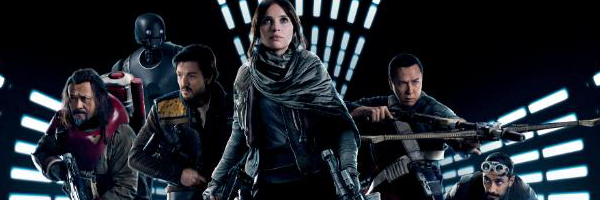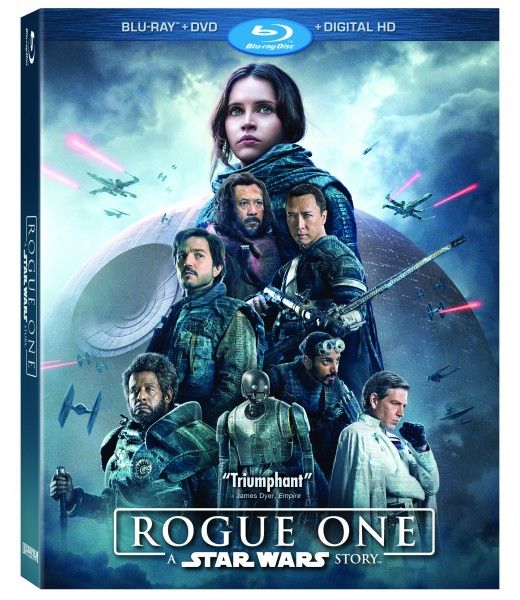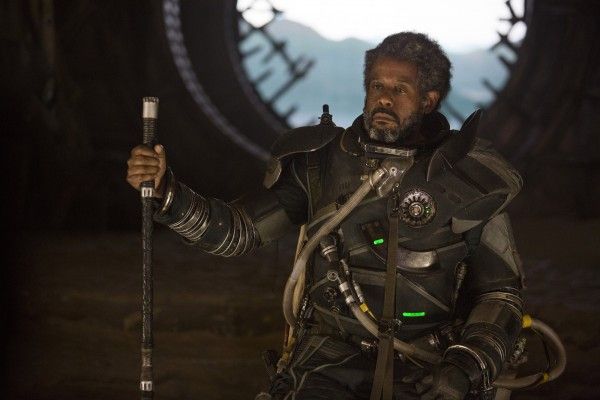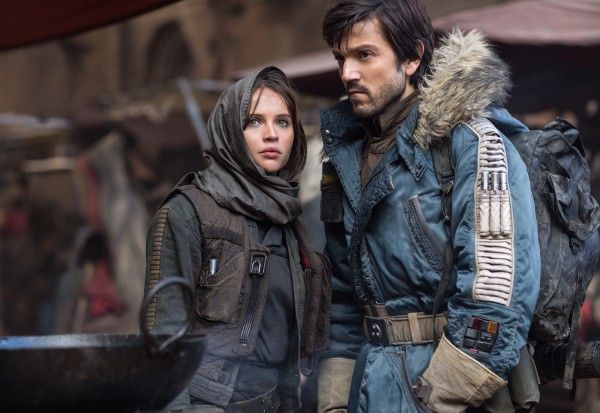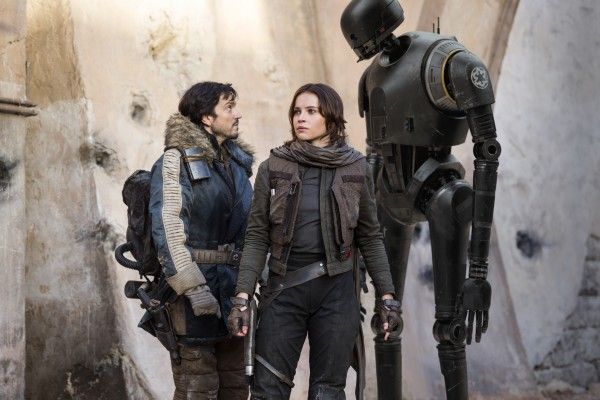By now, you’re probably pretty burnt out on the various different endings and changes made to Rogue One. All of these questions make a pretty good case that Disney should just release a warts-and-all behind the scenes book or documentary since it’s not like it’s going to hurt the revenue of Rogue One or any future Star Wars movie. They print money, and secrecy doesn’t automatically create mystique.
So last week while I had a chance to speak with writer Gary Whitta about Rogue One: A Star Wars Story, I was more curious about the overall process of working on a Star Wars film rather than being the 3,497th person to ask him “How did the ending change?” During our conversation on the phone, we spoke about how he got involved with the project, the level of studio involvement, how writing on Rogue One compares to his work on Star Wars Rebels, the unique process of writing a story-driven game like The Walking Dead, his thoughts on the Sherlock Holmes 3 writers room, and more.
Check out the full interview below. Rogue One: A Star Wars Story hits Blu-ray, 3D Blu-ray, and DVD on April 4th.
COLLIDER: So the first thing I wanted to ask you about was how did you get involved with Rogue One and sort of how is your involvement reflected in the finished film?
GARY WHITTA: Wow, that’s a very big question. So the first part, I mean, going all the way back to the beginning, I remember specifically when I learned the films were coming back, this was before they announced JJ [Abrams] or any of that, they were just going to make new films, there was no talk of standalones or anything, really, but I was so excited just as a fan that the films were coming back, but also as a writer, I literally went straight from the news story on my phone to calling my agent, as I’m sure every writer in town that day was calling their agent saying, “You’ve gotta -- I want to be apart of it.” So I never seriously expected I would end up doing anything because, you know, it’s Star Wars, they can take their pick, they can get the best screenwriters in the world to work on these movies, and they truly did, I mean, Chris Weitz and Tony Gilroy, they helped make the movie way better. But they did eventually call me in for a general meeting, and I had a very vague conversation with them, it’s a little bit like the CIA. They’re very closely guarded, keep it a secret. So I went away not really sure why I even met with them, it was a very general chat, they asked me to kind of talk about what I like about Star Wars and I told them about when I was a kid growing up with the Star Wars films, and a couple of weeks later they sent me this document John Knoll [the one who came up with the original story] created called Destroyer of Worlds, which was this, you know, basically the idea of the rebels who stole the plans for the Death Star. And it was, you know, they had a good framework, it wasn’t a really a finished film, and kind of an early version of the Jyn Erso character and a couple of others, but it wasn’t, you know, a full screenplay or even like a full treatment for a story, it needed a lot of fleshing out, and so I went back and pitched some ideas to John Knoll, and I must’ve said something right. Actually I think I remember what I said, I remember looking at and saying, “This feels to me a little bit like a Star Wars version of Zero Dark Thirty,” and then you’ve got this kind of strong female character who’s determined to, you know, complete the mission and at the end there’s this really cool scene where they actually go do it, and much like Zero Dark Thirty, the idea of the film would be gritty, kind of militaristic, deep underground type feel. I remember when I referenced that movie, John kind of nodded a little bit, wow, I said something right there, I’m not quite sure what I did but I said the right thing. And then later, after they hired me, they showed me John’s original kind of presentation for the film, they had a bunch of clips and references to Zero Dark Thirty, and I said, okay, that’s kind of what -- we were on the same page about the sensibility we were going for, so that’s how I got the job.
Were there any mandates from the studio about what could and could not be done within the framework of a spinoff?
WHITTA: No. And that was the amazing thing about it, I mean, I would say the only mandate was to experiment and was to do different things. The only thing they didn’t want to see was things they had seen before. They were like, “Try not to visit old characters as much as possible, show us new characters, show us new stories, new worlds, show us things that don’t just cycle the familiar elements we’ve seen in the previous films.” And obviously there’s going to be some commonality because we’re telling the story about the Death Star plans and we know the Death Star’s going to be there and Princess Leia probably has to be there, and we decided we felt we had to have Vader in the film. But beyond that it was 90% new material, new characters, new DNA. Anything that felt a little familiar or a little bit too much like fanservice, they would kind of nudge us back the other and say, “Do something new, do something different, show us these characters.” So that was their mandate, to really try to expand the expectations of what you would get from a Star Wars film.
How did working on Rogue One compare to your work on Star Wars Rebels?
WHITTA: You work with a lot of the same people, because the story group of these films kind of overarches everything, the films, the TV shows, the comics, the video games, everything. So for example, Kiri Hart who’s the head of the story group at Lucasfilm who’s the person who hired me to work on Rogue One, she was in a lot of the story meetings for Rogue One and she was in the story meetings for Rebels as well, because there is kind of a holistic view that they take now. They’re not just telling stories, they’re telling stories that are all part of a wider universe, and Star Wars has always been that way. So there’s some commonalities, but -- and it’s common, it’s also kind of collaborative, being a TV show, Rebels is very collaborative the way the story develops. You sit around a big table with a bunch of other writers and you develop the story together. Typically when you write the movie, you don’t have that level of collaboration, you don’t generally have a big room of people, but at Lucasfilm you do, the story group guys are in there, and they’re pitching in and helping, far more so than any film I’ve ever done. Developing the story on Rogue One was by far the most collaborative experience I’ve ever had in feature film.
What would you, as a fan and as someone who’s now written for these Star Wars movies, what would you like to see going forward, whether it’s in the main saga or in the spinoffs?
WHITTA: You know, the strange thing is I’ve never actually given it that much thought. I lived in that little corner of the Rogue One box for so long that I never really thought that much about what else might be going on, I’m very interested to see what Rian does with Episode 8 and where they go on that and these other standalone films, but I never really gave it a lot of thought as a fan, I’m just -- I’m very curious to see what they do next and I would say that the one thing that rubbed off on me from working with the Lucasfilm guys, is I now as a fan definitely don’t want to see, again, just rehashes of the same characters and the same stories, I would really like to see new characters and new stories and see an expanded universe. You can’t just tell the same story over and over, I think that would have lasted forty years if they had done the same thing over and and over, and it certainly wouldn’t last another forty years. The one thing that John Knoll said was, “I want to see things that I’ve never seen before in Star Wars.” We tried to do that in Rogue One, and that’s the mandate on all the films going forward.
You’ve also worked on The Walking Dead video games. How has that experience been, when those games are wrapped up so heavily in players dictating the course of the narrative?
WHITTA: It’s by far the most challenging medium, most challenging form of writing I’ve ever done. You want to create compelling characters and a story that people will, you know, tune back into for the next episode and you want to surprise them and do things that are original and unexpected and not cliche, all of those things. You still have the same burdens of film and television and literature and video games, but the additional burden of, well, you have to let the audience, the audience is somewhat your co-writer, they get to decide if this character lives or dies or if this character’s a good guy or a bad guy, and so to be able to allow the audience to have that level of participation and at the same time make sure that whatever story they decide to experience is as satisfying as any other and they have a good time no matter what they choose. It’s actually really, really hard to do, and it’s hard for me to explain how difficult it is, but once you kind of have your hands in the guts of the mindbending logic of all the different stories [the connection briefly cuts out] ...really satisfying because when people play the game, they all experience something different, and so any time you talk to someone about the TV show they might have different views, but you saw the same show. If you talk to someone about The Walking Dead video game, they actually had a different experience, their story wasn’t the same as someone else’s. So that’s really interesting, it’s just a lot of hard work to get there.
When you’re writing those games, do you sort of like -- and you know, all Telltale games have sort of that model of “so and so will remember that” -- when you’re writing, do you sort of have to make note of set-ups and pay-off in that framework?
WHITTA: Yeah, I mean, there certainly are things that -- and bear in mind, every time something like that pops up on the screen, it only happens every now and again, every single choice that you make there’s a memory space that gets created and the game’s remembering something you did before, it just does those every now and again to try to make sure that you are aware of the fact that you’ve done something that might have a consequence later on. But yeah, I mean, the episode arc I wrote, there was a thing at the end where you need to go off on a mission and there’s like six other guys with you and you have to decide if they’re gonna come help you. And the -- if I showed it to you, your mind would melt -- the logic that the game has to go through for each character to reach that decision, do I like them, maybe I’ll go with you, but then you did something that helps this other character that I didn’t like in episode 3 and that means I’m not gonna help you, and it just goes on and on and on, it’s this huge kind of logical cascade that leads to so many different outcomes. When it works, it’s fantastic, but to get to that and make sure it works and doesn’t break, you’ll tear your hair out.
It’s also been reported that you’re part of the writer’s room on Sherlock Holmes 3, and I was curious, what would you say is the benefit of a writer’s room compared to the traditional way of working on a screenplay?
WHITTA: You know, it’s something that used to be a kind of more popular trend, now it’s always the way that television’s being developed, you know, a bunch of people sitting around at a table, instead of a brain trust you’re sharing ideas and bouncing off one another. It’s not something you typically see in film, but it is becoming increasingly a thing now. Whether or not it’s a positive development for writers and screenwriting, I don’t know, it’s too early to say. I can tell you that I’ve enjoyed the experience and I generally -- I mean, I can speak to my experience on Rogue One and Rebels, which is that the movie and the TV show that were made are way better for the fact that we had a bunch of people contributing than they would’ve been if it were just me in a room isolated on my own trying to think up ideas without anyone to bounce stuff off. So I’m always happy to have a lot of people in the room with me, it’s not that hard to find them, and again, whether it’s going to become the norm for how movies are made, I’ve enjoyed the experience of developing stories that way.
Is there anything beyond Sherlock Holmes 3 that you’re working on right now?
WHITTA: Right now I’m working on a feature film adaptation of a comic book series called Mouse Guard for 20th Century Fox with Matt Reeves who directed the Planet of the Apes movie, he’s producing. Very excited about that. And I do have some involvement in Star Wars Rebels Season four, so you’ll see at least a little bit more Star Wars, my last little bit of Star Wars writing in that season. And then a bunch of stuff I’m not allowed to talk about. Mouse Guard’s the main thing.

